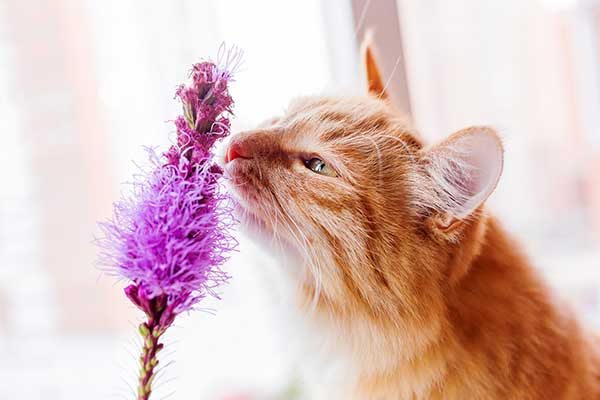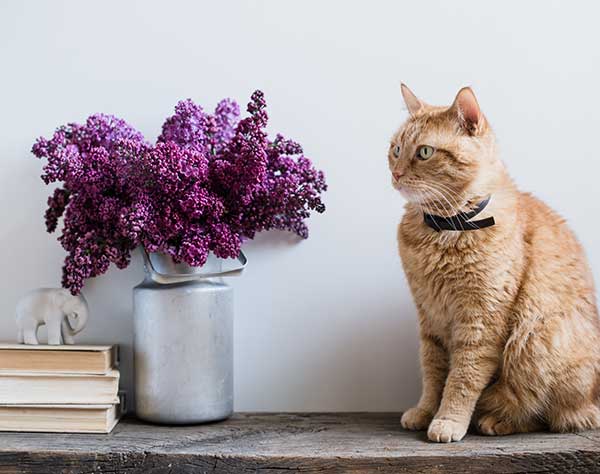Cats are inherently curious animals. They love to play with just about anything that they can lay their paws on, and that includes indoor plants.
If you’re a fan of indoor plants, you may have realized that your cat occasionally checks out the plants, sometimes even goes as far as to sniff or nibble on them.
To many pet owners, there shouldn’t be anything wrong with their cats playing with plants, whether indoor or outdoor. However, there is a long list of things that could go wrong if you freely allow your kitto to get too close to certain plants.
Various plant species could irritate your cat’s skin if the cat rubs against them, or their respiratory tract if they sniff on such plants.
Others might cause gastrointestinal complications if ingested. There are also some plants that are outright toxic for cats, and a little exposure is all it takes to make your cat pretty sick.
If you have lilac in your compound, you may now be wondering, Are Lilacs Poisonous To Cats?
While lilac doesn’t frequently appear among the plants considered toxic to cats, some lilac species are actually poisonous to cats. The plant might not kill your feline friend, alright. But it can cause severe disease, depending on the amount of lilac that your cat has ingested.
Read on as we unpack the topic of cats and lilac, by investigating the potential toxicity that these plants might present to your feline friend.
Table of Contents
Are Cats Attracted To Lilac?
One of the frequently asked questions among many cat owners is, is lilac poisonous to cats?
As we’ve already pointed out, certain lilac species may be toxic to your kitto. But even before we further examine the possible toxicity of lilac for cats, it’s important to highlight what exactly cats find attractive in lilac.

While cats are curious and will check out just about anything in your house or yard, lilacs appear to have special features that pull cats to them.
First, these plants are incredibly attractive, especially when they’re in bloom. Though cats don’t perceive color as well as humans do, they can fairly distinguish between bright and dull colors.
Therefore, the elegant color of lilac flowers in full bloom might be one of the reasons behind your cat’s love affair with these plants.
Secondly, lilacs have sweet-smelling flowers. It’s worth noting that cats have a considerably acute sense of smell, and can pick up the faintest scents from their environments.
What’s unclear, however, is whether they perceive smells the same way we do. But in the feline world, anything that exudes scent is worth investigating.
So, whichever way you look at it, there are numerous reasons why your cat might be attracted to lilac. But the question remains, are lilac plants poisonous to cats?
The following sections shall delve deeper into that.
Are Lilacs Poisonous To Cats If Ingested?
While lilacs are generally safe for cats, the plants may present toxicity if ingested. Some of the side effects to watch out for include gastrointestinal issues, such as constipation, diarrhea, and abdominal pain.
Remember that cats are obligate carnivores. As such, their digestive tract considers plant matter as a foreign substance.

That’s why ingesting lilac, in whichever quantity, might cause irritation to your cat’s stomach, leading to a wide spectrum of GI complications.
The side effects range in severity, depending on the amount and part of the plant that the cat has eaten. And that begs the questions, are lilac flowers poisonous to cats? And what about the leaves, are lilac leaves poisonous to cats?
If the lilac in question is one of the varieties considered non-toxic to cats, then there might not be any severe side effects to expect apart from mild gastrointestinal irritation. That’s regardless of the part of the plant that your cat has eaten.
But if you’re dealing with poisonous lilac varieties, then the leaves and seeds might be more toxic than the flowers. That’s because the poisonous chemicals in toxic plants are usually more abundant in the leaves of the plant. As the plants proceed to flower, the severity of the toxicity tends to reduce.
So, are lilac flowers toxic to cats?
Again, it depends on the toxicity of the plant in question.
But what about the stems?
While the leaves of poisonous lilac species carry the highest concentration of the dangerous chemicals, the stems usually present higher risks of choking. Therefore, cats shouldn’t eat lilac stems either.
It’s worth pointing out that anything that can go wrong if your cat ingests lilac will surely go wrong if the lilac in question is one of the toxic species. Which begs the question, are lilac bushes poisonous to cats and if yes, what are some of the species of lilacs that are outright toxic to cats?

Popular Lilac Species
1. Common Lilac
Scientifically known as Syringa vulgaris, this is the lilac plant that you’re most likely familiar with. In most regions around the world, this lilac variety is over 60% more abundant than all the other lilac species combined.
Common lilac is characterized by lilac-colored flowers and an inviting fragrance. The plants usually grow to about 20 feet tall.
In terms of toxicity, common lilacs are the least toxic to cats, which is a great thing considering they’re the most prevalent lilac varieties.
2. Persian Lilacs
Also known as Chinaberry, Texas umbrella tree, or white cedar, Persian lilacs are smaller than their common counterparts, with the tallest growing to just about 8 feet.
These plants produce pale lilac flowers, which are also significantly smaller than those of common lilacs.
The seeds of Persian lilacs contain Melia toxins A & B, which accounts for the plant’s toxicity for cats. Possible signs of toxicity include vomiting, diarrhea, drooling, tremors, and muscle contractions.
The scientific name for Persian lilacs is Syringa x persica.
- EASY TO USE, IMPACTFUL RESULTS: Collect a sample, package it up, and send it securely back. Just register, swab, return with the...
- MOST COMPREHENSIVE BREED & TRAIT: Our test distinguishes over 20+ distinct breeds and 50+ trait markers with the most...
- SCREEN FOR 40+ GENETIC DISEASES: Get peace of mind by screening for 64 health markers associated with 43 diseases for which your...
Last update on 2024-07-23 / Affiliate links / Images from Amazon Product Advertising API
3. French Lilac
French lilacs are considered some of the rarest, usually appearing for a few weeks during spring and summer in Conservatory Gardens.
Their flowers sport various colors when in bloom, including white, pink, blue, or purple.
French lilacs go by numerous other names, including goats rue and professor weed.
They contain a neurotoxic and hypotensive chemical known as galegin, which is highly toxic to cats. Ingesting this compound causes several complications, ranging from pulmonary edema to hydrothorax, and even death.

Besides the species, there are also questions of color and you may be wondering, are purple lilacs poisonous to cats?
Well, the color doesn’t really matter. What should concern you the most is the toxicity of the lilac variant in question.
Are Lilacs Harmful To Cats?
Are lilacs bad for cats?
Though we’ve already mentioned it throughout the post, it warrants repeating that lilac is generally safe for cats. However, there are a few species that might be toxic to your feline friend.
Also, just by virtue of being a plant, you should do everything possible to ensure that your cat stays as far away from lilac as possible.
Checkout Our Favorite Cat Products
1. Best WI-Fi Pet Camera
Our favorite: Petcube Smart Pet Camera with Interactive Laser Toy – monitor 24/7 from your phone with Petcube Play Wi-Fi pet cam, chat with your pet, play with your fur baby with the built-in pet safe laser from your phone, enjoy free cloud video storage.
2. Best Online Course For Cat Parents
Our favorite: The Cat Language Bible (How to Finally Undrestand And Speak to Your Cat) – A new form of cat to human communication that many cat owners have dreamed about… but few have actually thought possible.
3. Best Vacuum to Tackle Pet Hair
Our favorite: Dyson Ball Animal 2 – Engineered for homes with pets. With features and tools that dig out dirt, hair and allergens everywhere your pet gets.




